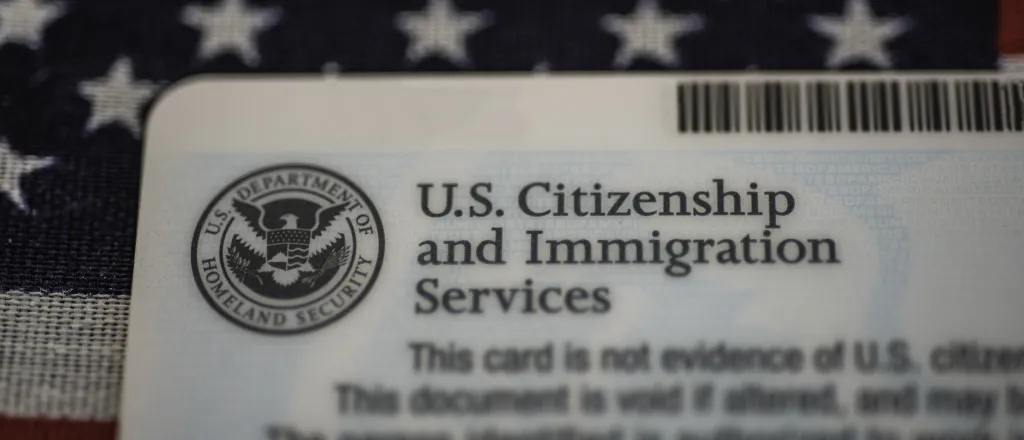
Colorado immigration protection bill clears Senate vote
The Colorado Senate approved a bill Monday that would put data protections in place for immigrants and limit where federal immigration authorities can physically access without a warrant. The legislation comes in direct response to the Trump administration’s mass deportation efforts.
Senate Bill 25-276 passed on a 22-13 vote and now heads to the House for consideration in the final weeks of the legislative session.

© fotoguy22 - iStock - 1468912821
“The question of who actually gets to be an American, or who actually gets to be protected by the Constitution, is a matter of debate right now in this country and in this state. We’ve had conversations with teachers and with school districts that are concerned about students being too afraid to come to class and about parents being afraid to go to parent teacher conferences. We can do better than that,” said bill sponsor Sen. Julie Gonzales, a Denver Democrat.
The bill would prevent Immigration and Customs Enforcement officers from going into non-public spaces in jails, hospitals, schools and child care centers without a signed, valid warrant. An amendment on the Senate floor added libraries to that list of locations.
It also clarifies that local law enforcement cannot cooperate with ICE to land a person in custody through a detainer request by holding that person in jail beyond their ordered release without a warrant.
The bill also deals heavily with personally identifiable information, or data about a person that is not publicly available such as birthday, addresses, vehicle registration information and immigration status, which federal authorities might want access to in order to identify people to detain and deport. Local governments would not be allowed to share that type of information with ICE under the bill.
Additionally, immigrants would not need to sign an affidavit about their intention to pursue legal status in order to get a driver’s license or in-state tuition.
“We’re in unprecedented times, where people are being unjustly targeted, incarcerated, removed and deported, and we sit in a position where we might be able to push back and help out, to provide some sort of protection,” said Sen. Jessie Danielson, a Wheat Ridge Democrat. “It is a terrifying time for a number of people I know, and for a lot of people I don’t, and it doesn’t take much for me to empathize with that.”
GOP: Lawsuits likely
The bill comes three months into the second administration of President Donald Trump, who has followed through on a campaign promise to increase efforts to detain and remove immigrants who lack legal status. In Colorado, that has resulted in a series of highly-publicized immigration raids at a party in Adams County and residences in Denver and Aurora and in the detention of immigration rights activist Jeanette Vizguerra.
In addition to Gonzales, the bill is sponsored by Sen. Mike Weissman, an Aurora Democrat, Rep. Lorena Garcia, an Adams County Democrat, and Rep. Elizabeth Velasco, a Glenwood Springs Democrat.

Sen. Kyle Mullica, a Thornton Democrat, joined Republicans in opposition to the bill. Mullica said his vote was in response to a series of amendments offered during the final vote on Monday — usually amendments are considered during the initial debate and preliminary vote on a bill — and that he did not have sufficient time to read the amendments and consider their implications. One amendment on Monday, for example, clarified that SB-276 does not intend to ban the transfer of a person to and from federal custody if there is a valid warrant.
“This isn’t a position in cement that I’m not willing to move,” he said. “I want the opportunity to digest these amendments and see if there are any amendments that address potential concerns in the second chamber.”
If the House passes a version of the bill with other amendments, the Senate would need to sign off on those changes before the bill heads to the governor’s desk for a signature.
Republicans argued that the bill interferes with federal policy and impedes legal ICE operations, going against the supremacy clause of the U.S. Constitution. The bill’s passage would likely result in lawsuits, they said.
“This undermines federal immigration enforcement. The bill restricts cooperation between state, local entities and federal immigration authorities, potentially obstructing that of which is the province of the federal government — immigration laws,” said Minority Leader Paul Lundeen, a Monument Republican.
Debate on the bill lasted an entire day last week as Republicans offered amendments that ultimately failed to block it. The bill is likely to face a similarly protracted discussion in the House if chamber leadership decides not to limit the length of debate.
















